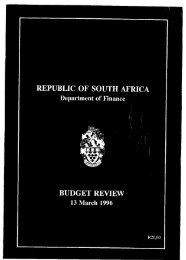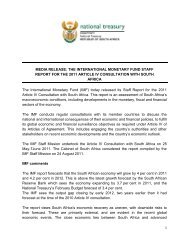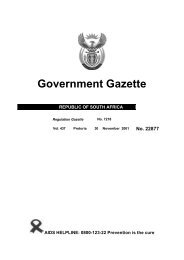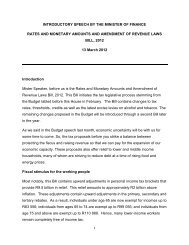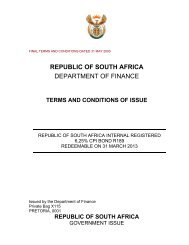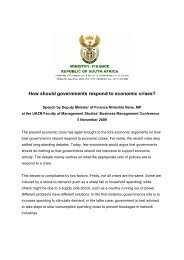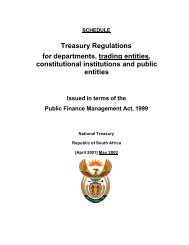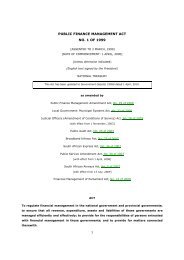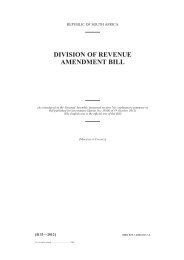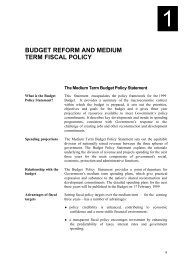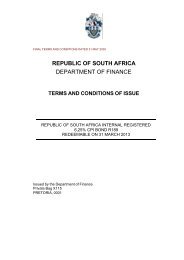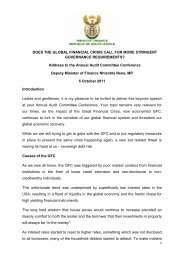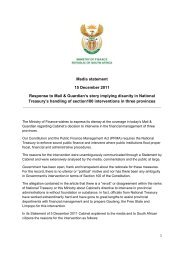1998 SOUTHERN AFRICA ECONOMIC ... - National Treasury
1998 SOUTHERN AFRICA ECONOMIC ... - National Treasury
1998 SOUTHERN AFRICA ECONOMIC ... - National Treasury
Create successful ePaper yourself
Turn your PDF publications into a flip-book with our unique Google optimized e-Paper software.
M O Z A M B IQ U E<br />
combined with a set of measures implemented by the<br />
authorities aiming at improving its reve nue collection.T h e re was<br />
a slight worsening of the fiscal deficit as a percentage of GDP,<br />
which is mainly attributable to the increase of expenditure more<br />
than reve nu e. It should be noted however that a 23 perc e n t<br />
i n c rease in trade related reve nue has been achieved since the<br />
contracting of the British Crown Agents in May 1997 to assist in<br />
the operation of the customs serv i c e.<br />
The cumu l a t i ve average inflation rate up to end-December 1997<br />
declined sharply to 5.8 percent from a level of 24.3 percent in<br />
the same period of the previous ye a r.The slow down of inflation<br />
is a result of the improvement in the monetary contro l ,<br />
exchange rate stability, and the strong supply response in the<br />
e c o n o my. In fact,inflation begun a declining trend in 1995 with a<br />
c u mu l a t i ve rate of 54.2 percent after 70.0 percent in 1994.<br />
The current account, in nominal US dollar terms, i m p roved by<br />
4.2 perc e n t ,as a result of the increase in exports by 6.7 perc e n t<br />
with imports increasing by 0.8 perc e n t .<br />
The currency (Metical) maintained a strong perfo r m a n c e,<br />
resulting in a cumu l a t i ve nominal depreciation of only 1.5<br />
p e rcent in the official exchange market and an ap p reciation by<br />
1.7 percent in the parallel marke t . As a re s u l t , the spre a d<br />
b e t ween the exchange rates of the two markets re m a i n e d<br />
b e l ow 2 perc e n t .The exchange rate stability was mainly due to<br />
a tight monetary policy, the good performance of the external<br />
sector combined with favourable inflows of external assistance<br />
f u n d s , as well as the dynamism of the interbank exchange<br />
m a r ke t .<br />
M o n ey supply growth has increased slightly from 13.2 perc e n t<br />
in 1996 to 16.6 percent in 1997.The authorities shifted tow a rd s<br />
i n d i rect monetary contro l , with the creation of the interbank<br />
m o n ey market in September, w h e re tre a s u ry bills and monetary<br />
authority bill are traded. The interbank money market also<br />
a l l ows commercial banks to lend and borrow funds to each<br />
o t h e r. The interbank exchange market operation has been<br />
i m p rove d ,with the introduction of non-fixing sessions.<br />
With the conclusion of the Paris Club A g re e m e n t s ,about 10<br />
p e rcent of the Mozambican external debt was re d u c e d . O f<br />
these USD500m we re rescheduled and USD100m cancelled.<br />
A dd i t i o n a l ly, in recognition of the country ’s re c o rd of economic<br />
re fo r m s ,the World Bank and the IMF along with other donors<br />
decided on April 7, <strong>1998</strong> to provide exceptional support ,<br />
amounting to USD2.9 billion in nominal terms in debt serv i c e<br />
relief for Mozambique, equivalent to USD1.4 billion in Net<br />
P resent Value terms in June 1999.<br />
With this initiative Mozambique’s external debt will be re d u c e d<br />
f rom USD5.6 billion in late 1996 to USD1.1 billion in June 1999<br />
when the HIPC (Highly Indebted Poor Countries) package is<br />
i m p l e m e n t e d .Debt service payments will have been reduced to<br />
b e l ow 20 percent of export earnings.The stock of debt in NPV<br />
terms will be reduced to 200 percent of export s ,c o m p a red to<br />
466 percent without the initiative.<br />
Financial Institutions<br />
The Government of Mozambique and the World Bank have<br />
d eveloped a financial sector adjustment programme aimed at<br />
i m p roving the efficiency of the banking sector, d eveloping the<br />
m o n ey and capital marke t s , and fo r mulating better re g u l a t i o n s<br />
governing the sector.<br />
The Banco de Moçambique was split into a central bank and a<br />
c o m m e rcial bank (Banco Comercial de Moçambique) in 1992.<br />
The independence of the central bank was laid down in law,<br />
although it is stated that the bank must respect the economic<br />
policy defined by the gove r n m e n t . Since then it has increased its<br />
independence and expanded its oversight cap a b i l i t i e s .<br />
T h e re are seven commercial banks operating in Mozambique,<br />
and some are beginning to take steps fo r w a rd in terms of<br />
o f fering their customers new products and taking marke t -<br />
oriented initiative s . The newest entrant on the banking scene is<br />
Banco Internaçional de Moçambique Investimento that was<br />
c reated in early <strong>1998</strong>. The bank is co-owned by Po rt u g u e s e<br />
Banco Commercial Po rtuguês (25 perc e n t ),its subsidiary Banco<br />
International de Moçambique (50 percent) the IFC (15 perc e n t ),<br />
and the parastatals Te l e c o m municações de Moçambique and<br />
Electricidade de Moçambique each own 5 perc e n t . B I M<br />
I nvestimento will concentrate on joint-ve n t u res in connection<br />
with the current privatisation pro g r a m m e, and on the<br />
d evelopment of links with South A f r i c a . Electricidade de<br />
M o ç a m b i q u e ’s interests in the bank is associated with its<br />
p robable invo l vement in future hy d roelectric projects in the<br />
Zambezi valley and the construction of an aluminum smelter<br />
outside Map u t o.<br />
In September 1997 the government sold sixty percent of the<br />
last state-owned bank, the Pe o p l e ’s Development Bank, t o<br />
Southern Bank Berhard of Malaysia and a Mozambican private<br />
c o m p a ny, I nve s t e c. The state retained 20 percent of the share s<br />
and 20 percent we re re s e rved for bank employees and<br />
m a n a g e r s . Liberalisation of the insurance sector is also<br />
p ro c e e d i n g , but as yet there are no long-term insurers in<br />
M o z a m b i q u e.<br />
The money market is still undeveloped in Mozambique, a l t h o u g h<br />
the legal framework for a money market is under finalisation.<br />
The central bank issues short-term bonds on a quart e r ly basis,<br />
which are sold mainly to commercial banks. The info r m a l<br />
m o n ey market is used extensive ly.<br />
Mozambique Stock Exchange<br />
One of the key reasons for the establishment of a stock<br />
exchange in Maputo is to provide a vehicle for the facilitation of<br />
the privatisation pro g r a m m e. The “Installation Commission fo r<br />
the Mozambique Stock Exchange” was consequently set up<br />
under the Ministry of Planning and Finance in 1997 to pre p a re<br />
for the establishment of the exchange. The work is curre n t ly in<br />
its final stages and the market is expected to open befo re the<br />
end of <strong>1998</strong>.<br />
E x c h a n ge Contro l s<br />
Fo reign investors are permitted to operate both local and<br />
fo reign currency accounts. Fo reign currency accounts fo r<br />
i nvestors may be denominated as retention accounts, m e a n i n g<br />
the availability of fo reign currency is guaranteed. Fo re i g n<br />
retention accounts, w h e re fo reign currency receipts fro m<br />
M o z a m b i q u e - d e r i ved production and sales are re c e i ved and<br />
held in fo reign bank accounts, a re permitted on a case-by - c a s e<br />
b a s i s .<br />
The right to repatriate cap i t a l ,dividends and other distributions<br />
of profit is guaranteed by law to fo reign inve s t o r s .Firms are<br />
obliged to register all imports of goods or money with the<br />
Central Bank. F u t u re repatriation of non-re g i s t e red inve s t m e n t<br />
is not guaranteed.<br />
Fo reign Tr a d e<br />
M o z a m b i q u e ’s principal trading partners are South A f r i c a ,<br />
Po rt u g a l ,S p a i n ,USA and Jap a n . Due to the limited industrial and<br />
food production in Mozambique, the value of the country ’s<br />
i m p o rts far exceeds that of its export s .<br />
The country ’s main export products are cashew nu t s , p r aw n s ,<br />
lobster and cotton. Main import goods are transport and<br />
electrical equipment, food and ve g e t a b l e s .<br />
56



